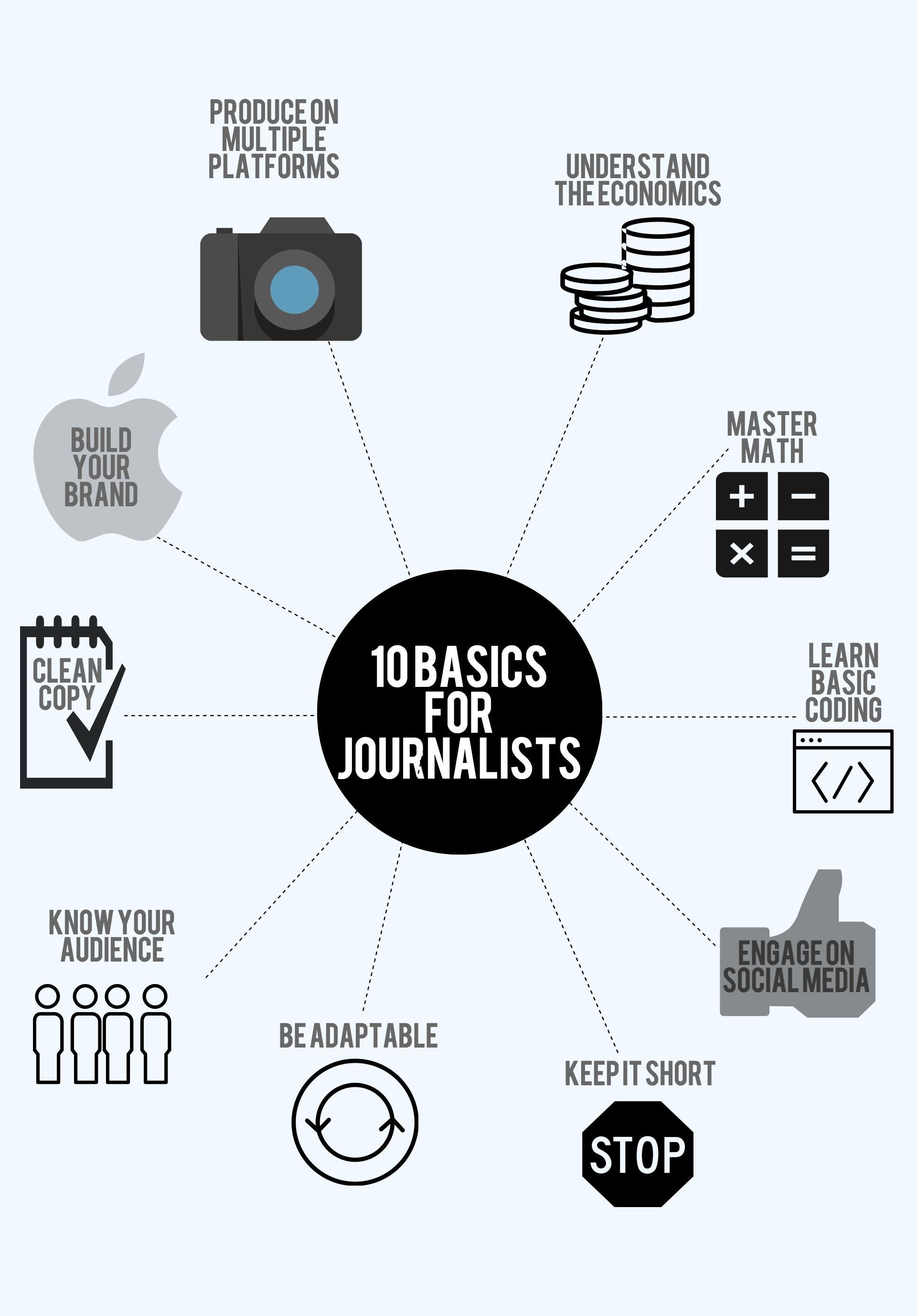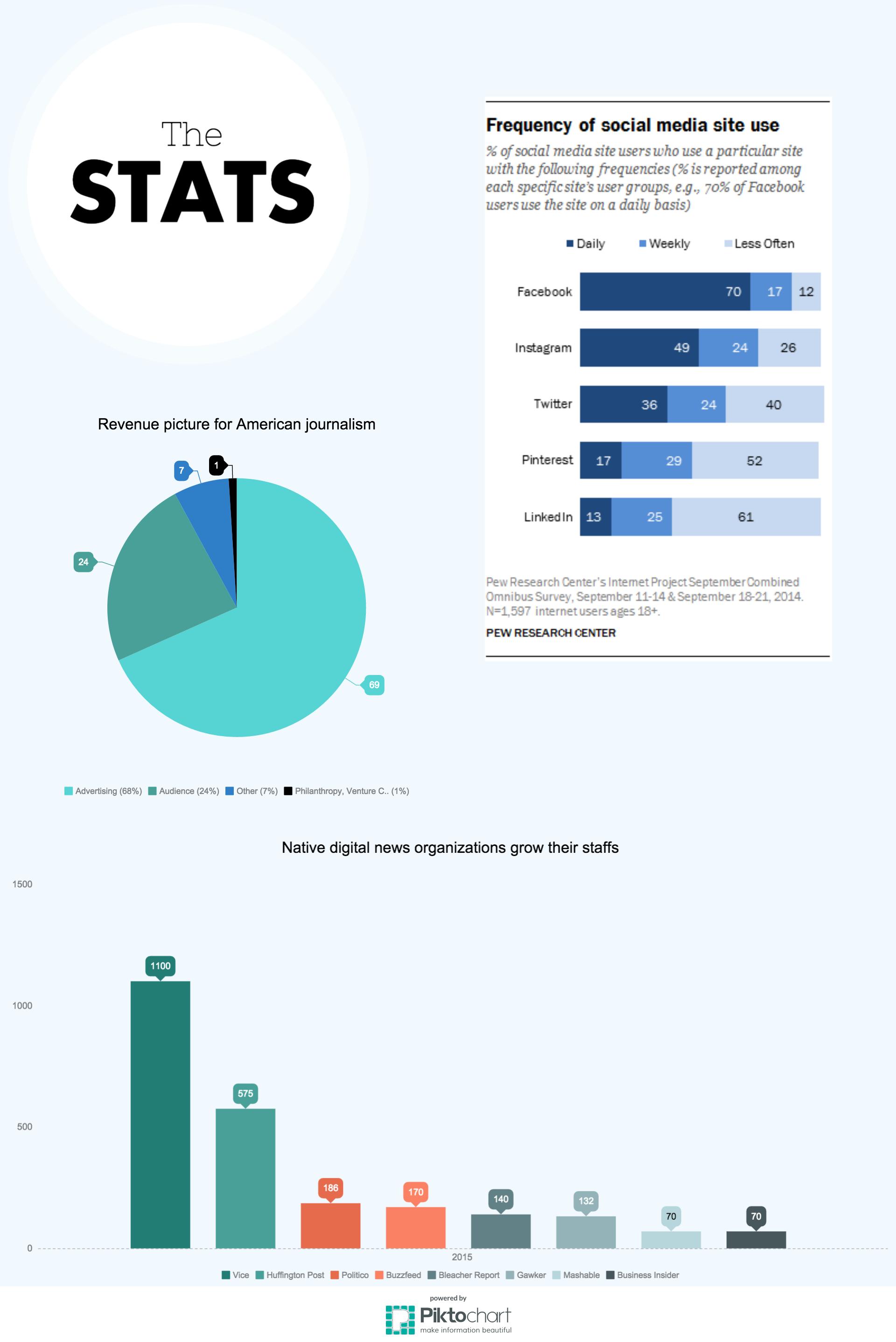
10 basics today’s journalists need

One week into college, my journalism professor gave a lecture on what journalists need to know—except he didn’t really explain anything. He just complained about the fact that journalists were expected to know too much.
I panicked.
That week, I changed my major three times, looking for something that encompassed every skill needed in the media industry. I’ll save prospective students the trouble: It doesn’t exist.
That’s because the industry changes too quickly for any curriculum to keep up. I realized that I needed to figure it out for myself.
As a journalism student, I’ve been searching for a definitive answer for the past three years. I’ve consulted media professionals to gather the building blocks of a journalism career in the digital age. I’m talking about more than just bread-and-butter reporting. One conclusion surprised me: We don’t need to be well versed in every single app and every line of code. But we do need to understand the bigger picture.
Here’s what I believe today’s journalism students need to know (in no particular order):
1. Learn basic coding: A little code goes a long way. In a phone interview, Ted Spiker, the journalism department chair at the University of Florida where I am a student, said it is debatable if full-blown coding is for everyone, but I think it brings considerable advantages. If you understand what’s under the hood of technology, you can be more effective and efficient. Knight Foundation’s Eric Newton said, “Basic coding is the grammar of the 21st century.” Those fundamentals include some ability to hack your way through basic HTML, to understand embed codes and to be able to navigate a content-management system. Start here.
2. Master math: Most journalists see numbers and cringe. Yet they need to know it to analyze data. Sports stories have scores and statistics. City beats have tax rates and census data. Political reporting has percentages and donation records. To sort through that, journalists need to know Microsoft Excel. There’s no sense in throwing out unemployment numbers if you can’t break them down for readers. So, make sure you can calculate the mean, the median, percentages and ratios. The key is to embrace numbers as a regular part of reporting, Spiker said. Start here.
3. Understand the economics: Journalists have to understand the economics of the industry if they are going to become leaders. They need to know where revenue comes from in media projects. The Poynter Institute’s Vicki Krueger said students should be fluent in the business side of the industry to understand their place in an organization. Beyond that, this is important to know if your career is financially viable. Start here.
4. Know your audience: Understanding the economics of the business leads to understanding audience, metrics and engagement. News is a conversation, not just a publication, Krueger said. It’s not enough to know how many followers you have. Understand where followers come from and what content they respond to. Your audience is not going to be the same on every platform, so it’s important to understand which readers are where. Engage in conversation with readers. Some companies track digital viewership on Omniture or Google Analytics. Find out what analytics you have access to, but make sure you’re looking at more than just the number of visitors. Start here.
5. Build your brand: If you’re lucky enough to have an individual brand, readers should associate you with a topic the way they associate Kleenex with tissues. Getting a job isn’t just about your skills anymore. Having a following brings traffic and revenue to a company. It usually happens naturally with journalists who are very involved in social media. Poynter says branding starts online, where all your online platforms and personalities meet. Build a personal blog or website. Start here.
6. Engage on social media: Many sources are making news on social media. Consider police and fire agencies that use Twitter to share updates, which are picked up by journalists and breaking news accounts. Influential figures such as celebrities are more likely to make news now posting something online (Taylor Swift, anyone?). It’s okay to get information from social media, and you should (if you can verify it). Try live reporting via Twitter at an event, and then use those tweets as notes to write a story at the end of the day. Facebook is a little different. Seek reader input and highlight the important quotes. Use Snapchat and Instagram to make readers feel part of a story. Start here.
7. Keep it under 140: With the introduction of text alerts, journalists need to communicate the news in the shortest, most effective way possible. You need to summarize the story in 140 characters or less, including the link to your work. (What would we do without bit.ly?) Your blurb also has to be compelling enough to get readers to follow the link. I practice this is by enabling character count on my text messages, but another huge part of this is search engine optimization (SEO). Your headlines must contain key words, so when readers search for information, your work comes up first. Start here.
8. Produce content on multiple platforms: Increasingly, reporters need to know how to photograph, edit, create video and create graphics. That no longer means carrying around heavy equipment; filming and editing on a smartphone will do. Many outlets use Videolicious, a company that Knight Foundation has invested in through its Enterprise Fund, to shoot, edit and publish short video. It’s the expectation of digital readers that your work will include more than just text. It’s not enough to simply know the skills, though. Spiker, the University of Florida’s journalism department chair, said students “with critical-thinking skills will be able to determine the best story presentations for different audiences and different pieces.” The list is endless. Start here.
9. Clean your copy: Being digitally savvy won’t mean anything if your work is littered with mistakes. Poynter’s Krueger said your credibility as a journalist depends on the messages you send. We are in an age of instant publishing, but being the first to post means nothing if eager readers find a simple mistake in seconds. Without clarity, the nature of our profession is lost. Familiarize yourself with the basics. Start here.
10. Stay adaptable: Today’s digital toolbox may not be tomorrow’s. The important skill, then, is a bigger one: the ability to adapt to new technology. Most of the important skills are more like talents: the ability to generate original and meaningful ideas, critical thinking, collaboration, and general knowledge as well as specialized knowledge in areas of interest.
To my fellow students: Make sure you explore every new skill and practice as it comes along. So where do you start? Write a blog post of your own about what students need to know. And then, in a few months, write it again. I know I will.
Paige Levin was a journalism intern for Knight Foundation. Follow her on Twitter @PaigeLevin.

Recent Content
-
Journalismarticle ·
-
Journalismarticle ·
-
Journalismarticle ·


